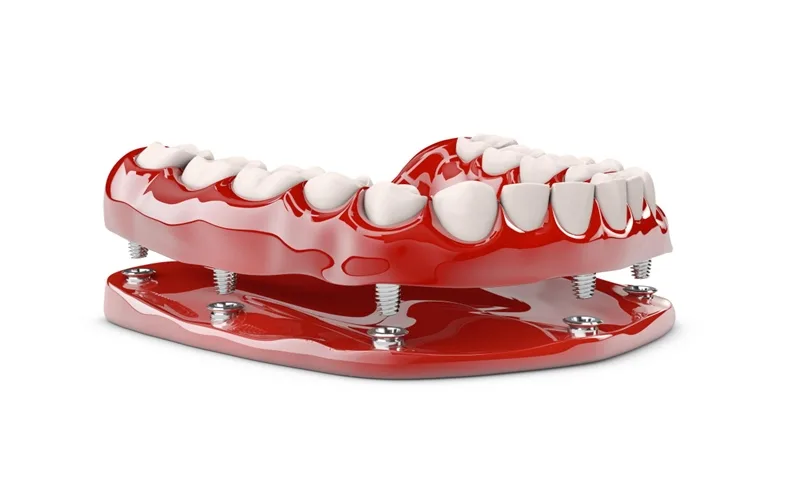What are Over Denture Implants? How are They Admistered?
Over denture implants are a modern dental solution designed to restore full function and appearance for individuals who have lost all or most of their teeth. Unlike traditional dentures, which rest on the gums and often require adhesives, they are anchored securely into the jawbone using dental implants. This added support improves comfort, stability, and chewing efficiency, making them a preferred option for many patients seeking a more permanent tooth replacement.
What Are Over Denture Implants and Who Needs Them?
Over denture implants are a combination of removable dentures and implant-supported technology. In this treatment, two or more dental implants are surgically placed into the jaw, and a specially made denture attaches to them via clips, snaps, or bars.
They are ideal for individuals who have lost most or all of their teeth and are looking for a more stable alternative to traditional dentures. They are especially beneficial for people who suffer from poor denture fit, speech difficulties, or chewing problems caused by loose dentures. They also help maintain jawbone health by stimulating the bone, preventing bone loss.
Over Denture Implants vs. Traditional Dentures: A Comprehensive Comparison
The differences between over denture implants and conventional dentures go far beyond appearance. Traditional dentures rely on suction and adhesive for stability, which can lead to slipping, gum irritation, and limited chewing ability.
In contrast, they are anchored into the jaw, allowing for a more secure and natural-feeling bite. They improve speech clarity, provide better chewing efficiency, and reduce the likelihood of embarrassing denture movement. Additionally, over denture implants help preserve jawbone volume, which often deteriorates with conventional dentures due to lack of stimulation.
Though more costly upfront, they often result in fewer long-term adjustments and greater patient satisfaction.
The Step-by-Step Procedure for Over Denture Implants
The process of getting over denture implants typically involves multiple steps, carried out over several months to ensure long-term success:
-
Consultation and Planning – A full dental exam, including imaging, is done to determine bone volume and implant placement.
-
Implant Surgery – Dental implants are surgically inserted into the jawbone.
-
Healing and Osseointegration – Over 3–6 months, the implants bond with the bone.
-
Abutment Placement – Small metal posts are attached to the implants to support the denture.
-
Denture Fabrication and Fitting – A custom denture is created to fit securely over the implants.
Each phase is carefully managed by your dental team to ensure optimal results and patient comfort.
How Much Do Over Denture Implants Cost? A Detailed Breakdown
The cost of over denture implants varies depending on several factors, such as:
-
The number of implants placed
-
The materials used for the denture and attachments
-
Geographic location and clinic experience
-
Additional procedures like extractions or bone grafting
On average, they range from $5,000 to $25,000 per arch in the United States. Though this may seem high compared to traditional dentures, the benefits—better functionality, appearance, and longevity—often justify the investment. Some dental insurance plans may cover part of the cost, and financing options are frequently available.
Pros and Cons of Over Denture Implants: What You Should Know

Over denture implants offer a long list of benefits, but they also come with some considerations.
Advantages
-
Stronger bite and better chewing function
-
Improved speech and appearance
-
Greater stability and comfort
-
Helps prevent bone loss in the jaw
Potential drawbacks
-
Higher initial cost than traditional dentures
-
Requires oral surgery and healing time
-
May involve multiple appointments over several months
-
Needs regular hygiene and professional maintenance
For many patients, the pros of over denture implants far outweigh the cons. With proper care, they can be a life-changing upgrade from standard dentures.
Over Denture Implants Recovery Timeline: What to Expect
After receiving over denture implants, recovery plays a key role in ensuring long-term success. The healing process varies depending on the individual’s health, the number of implants placed, and whether additional procedures (like bone grafting) were needed.
-
First few days: Swelling, minor bleeding, and discomfort are normal. Soft foods and rest are recommended.
-
1 to 2 weeks: Stitches (if not dissolvable) may be removed, and most soft tissue healing is well underway.
-
3 to 6 months: This is the osseointegration phase—when the implants fuse with the jawbone. During this time, a temporary denture may be worn until the final over denture is ready.
Following your dentist’s care instructions closely and attending regular check-ups will help ensure that your over denture implants heal properly and remain stable for years to come.
Are You a Candidate for Over Denture Implants? Eligibility Criteria Explained
Not everyone is automatically a candidate for over denture implants, but many patients qualify after a thorough evaluation. Ideal candidates typically meet the following criteria:
-
Have missing or severely damaged teeth
-
Have sufficient jawbone density or are willing to undergo bone grafting
-
Are in good general health, without uncontrolled chronic conditions
-
Are non-smokers or willing to quit during the healing phase
Age is not necessarily a limiting factor. In fact, many older adults benefit greatly from over denture implants due to the increased comfort and functionality compared to traditional dentures. Your dentist will assess your oral and overall health to determine if this treatment is right for you.
Maintaining Your Over Denture Implants: Tips for Long-Term Success
Like natural teeth and traditional dentures, over denture implants require regular maintenance. Good oral hygiene and professional cleanings are essential to prevent infection, implant failure, or wear on attachment components.
Here are some key maintenance tips:
-
Clean your dentures and implants daily using a soft brush and non-abrasive cleaner.
-
Remove the over denture each night to let the tissues rest and to clean thoroughly.
-
Rinse after meals to avoid food buildup.
-
Schedule regular dental visits every 6 months for professional cleanings and check-ups.
With consistent care, over denture implants can last many years, offering both function and confidence in your daily life.
Common Complications with Over Denture Implants and How to Avoid Them
While over denture implants are generally safe and successful, complications can occur if proper precautions aren’t taken. Some potential issues include:
-
Implant failure due to poor osseointegration or infection
-
Gum irritation or inflammation around the implant sites
-
Loose attachments from worn components
-
Difficulty adapting to the new denture fit
These problems are often preventable. Following post-surgical instructions, maintaining excellent oral hygiene, and avoiding habits like smoking or teeth grinding can dramatically reduce risks. Regular dental appointments allow your provider to catch and treat small issues before they become serious.
Over Denture Implants vs. All-on-4 Implants: Which Is Right for You?

Both over denture implants and All-on-4 implants are implant-supported solutions for full-arch tooth replacement, but they differ significantly in design and function.
-
Over denture implants involve fewer implants (typically 2 to 4), with a removable denture that clips on and off.
-
All-on-4 implants use 4 to 6 strategically angled implants to support a fixed (non-removable) full arch of teeth.
They are often more affordable and easier to maintain, making them a popular choice for those who prefer a removable option. All-on-4, while more costly, may offer a more natural feel for patients who want a permanent solution.
Your dentist will evaluate your needs, preferences, and budget to help you decide which option aligns best with your lifestyle.
Over Denture Implants: Improving Chewing Efficiency and Speech
One of the most life-changing benefits of over denture implants is the dramatic improvement in chewing ability and speech clarity. Traditional dentures often shift while eating, limiting the types of foods you can enjoy and making chewing less effective. They eliminate this issue by anchoring the denture securely in place.
With increased bite stability, patients can eat tougher foods like meat, nuts, and raw vegetables more comfortably. Additionally, because the denture is fixed more firmly, speech becomes clearer—especially for sounds that require tongue-to-palate contact, which can be disrupted by loose dentures. Over denture implants help restore natural oral function, leading to a better quality of life.
Understanding the Different Attachment Systems for Over Denture Implants
There are several types of attachment systems used in over denture implants, and the choice depends on your anatomy, personal preferences, and the number of implants placed. The most common types include:
-
Locator attachments – These use a snap-on mechanism and are known for their low profile and ease of use.
-
Bar attachments – A metal bar connects multiple implants, and the denture clips onto the bar. This provides excellent stability.
-
Ball attachments – Also known as stud attachments, these allow the denture to snap onto ball-shaped connectors.
Each system has its advantages in terms of retention strength, ease of cleaning, and comfort. Your dentist will help determine which system is best suited to your oral health and daily needs.
Over Denture Implants and Bone Preservation: The Connection
One of the often-overlooked advantages of over denture implants is their role in preserving jawbone structure. When natural teeth are lost, the jawbone begins to shrink due to lack of stimulation—a process called bone resorption. Traditional dentures sit on the gums and do nothing to stop this deterioration.
In contrast, they provide direct stimulation to the bone, much like natural tooth roots. This helps maintain bone density and facial structure, preventing the “sunken” appearance often seen in long-term denture wearers. Maintaining a healthy jawbone supports not only better oral function but also facial aesthetics over time.
For your information –> Hollywood Smile Turkey
Over Denture Implants: A Solution for Edentulous Patients
Edentulism—the condition of having no natural teeth—is more common than many realize, especially among older adults. For these patients, over denture implants offer a stable, functional, and aesthetically pleasing alternative to traditional removable dentures.
Unlike full dentures that rest uncomfortably on the gums and require adhesives, they snap securely into place, significantly improving daily comfort. They allow edentulous patients to eat, speak, and smile with confidence, and they contribute to better nutrition, oral health, and overall well-being. As a long-term solution, they help restore both dignity and quality of life.
Click to learn –> Dental Bone Graft
Questions to Ask Your Dentist Before a Over Denture Implants Procedure
Before undergoing treatment with over denture implants, it’s essential to have an open and informed discussion with your dentist or oral surgeon. Here are some key questions to consider:
-
How many implants will I need?
-
What type of attachment system is best for me?
-
Will I require bone grafting or other preparatory procedures?
-
How long will the full treatment process take?
-
What are the short-term and long-term costs involved?
-
How do I maintain the implants and denture properly?
Getting clear answers to these questions helps you understand the procedure, set expectations, and feel more confident in your decision. A well-informed patient is better prepared for a successful outcome with over denture implants.
It might interest you –> Dental implants Turkey

